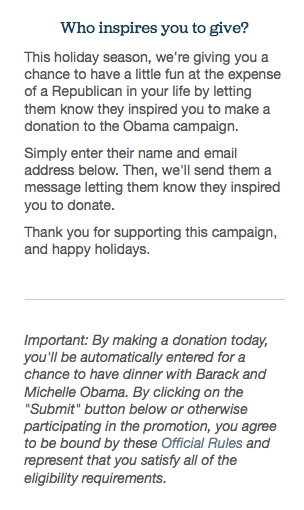Barack Obama wants to have some "fun" at the expense of republicans by asking lefties to give their email addresses to his re-election campaign. Why? So Obama campaign workers can spam your inbox with lefty propaganda.
The Obama presidential campaign is launching an effort to collect Republican email addresses by inviting its supporters to submit information about their Republican associates to the Obama 2012 website.
The effort could help the Obama campaign build a database that would enable it to target Republican voters during the general election campaign. But, more perniciously, it could also become part of an Democratic effort to influence Republican primary voters to select a candidate Democrats think Obama could most easily defeat.
The Obama information collection effort is cast under the mischievous guise of asking Obama supporters to “have a little fun at the expense of a Republican in your life” by signing them up to get an email from the Obama campaign ribbing them for having “inspired” the Obama supporter to donate.
From Obama's site:
It is a violation of federal law, the Can Spam Law, for a business to spam your email box if you did not give them your email address. It is illegal for them to send you a single email unless you personally signed up for it. Lefty "friends" can hand over your email address, but it is illegal for the Obama campaign to spam your inbox without your permission.
Do you use email in your business? The CAN-SPAM Act, a law that sets the rules for commercial email, establishes requirements for commercial messages, gives recipients the right to have you stop emailing them, and spells out tough penalties for violations.
Despite its name, the CAN-SPAM Act doesn’t apply just to bulk email. It covers all commercial messages, which the law defines as “any electronic mail message the primary purpose of which is the commercial advertisement or promotion of a commercial product or service,” including email that promotes content on commercial websites. The law makes no exception for business-to-business email. That means all email – for example, a message to former customers announcing a new product line – must comply with the law.
Each separate email in violation of the CAN-SPAM Act is subject to penalties of up to $16,000, so non-compliance can be costly. But following the law isn’t complicated. Here’s a rundown of CAN-SPAM’s main requirements:
1. Don’t use false or misleading header information. Your “From,” “To,” “Reply-To,” and routing information – including the originating domain name and email address – must be accurate and identify the person or business who initiated the message2. Don’t use deceptive subject lines. The subject line must accurately reflect the content of the message.
3. Identify the message as an ad. The law gives you a lot of leeway in how to do this, but you must disclose clearly and conspicuously that your message is an advertisement.
4. Tell recipients where you’re located. Your message must include your valid physical postal address. This can be your current street address, a post office box you’ve registered with the U.S. Postal Service, or a private mailbox you’ve registered with a commercial mail receiving agency established under Postal Service regulations.
5. Tell recipients how to opt out of receiving future email from you. Your message must include a clear and conspicuous explanation of how the recipient can opt out of getting email from you in the future. Craft the notice in a way that’s easy for an ordinary person to recognize, read, and understand. Creative use of type size, color, and location can improve clarity. Give a return email address or another easy Internet-based way to allow people to communicate their choice to you. You may create a menu to allow a recipient to opt out of certain types of messages, but you must include the option to stop all commercial messages from you. Make sure your spam filter doesn’t block these opt-out requests.
6. Honor opt-out requests promptly. Any opt-out mechanism you offer must be able to process opt-out requests for at least 30 days after you send your message. You must honor a recipient’s opt-out request within 10 business days. You can’t charge a fee, require the recipient to give you any personally identifying information beyond an email address, or make the recipient take any step other than sending a reply email or visiting a single page on an Internet website as a condition for honoring an opt-out request. Once people have told you they don’t want to receive more messages from you, you can’t sell or transfer their email addresses, even in the form of a mailing list. The only exception is that you may transfer the addresses to a company you’ve hired to help you comply with the CAN-SPAM Act.
7. Monitor what others are doing on your behalf. The law makes clear that even if you hire another company to handle your email marketing, you can’t contract away your legal responsibility to comply with the law. Both the company whose product is promoted in the message and the company that actually sends the message may be held legally responsible.
Recommended
Should we take bets on how the Justice Department will weasel their way around this one in the name of Obama's re-election? After all, Obama thinks he is above the law, this is just one more example.

























Join the conversation as a VIP Member